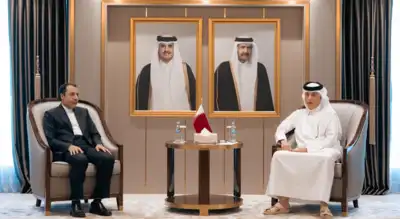ARTICLE AD BOX

Sultan bin Saad Al-Muraikhi, Qatar’s Minister of State for Foreign Affairs, met with the Iranian Ambassador to express the country's condemnation of the missile strike.
In a significant diplomatic move on Tuesday, Qatar summoned Iranian Ambassador Ali Saleh Abadi after the Iranian Revolutionary Guard Corps (IRGC) launched missile strikes on the U.S.
military base at Al Udeid in Qatar. The attack, which took place on the night of Monday, June 23, 2025, prompted Qatar’s Ministry of Foreign Affairs to issue a statement condemning the assault and asserting that it constituted a flagrant violation of Qatari sovereignty, airspace, and international law, particularly under the United Nations Charter.
Qatar’s Diplomatic Response and Condemnation
Qatar’s Ministry of Foreign Affairs made it clear that it viewed the attack as a serious breach of its sovereignty, with a focus on its implications for both regional stability and Qatar’s long-standing diplomatic efforts to maintain good relations with Iran.
Minister of State for Foreign Affairs Sultan bin Saad Al-Muraikhi met with Iranian Ambassador Abadi, where he emphasized the importance of dialogue and diplomacy in resolving regional disputes. "His Excellency Sultan bin Saad Al-Muraikhi, Minister of State for Foreign Affairs, emphasized to the Iranian Ambassador that this violation is completely inconsistent with the principle of good neighbourliness and the close relations between the State of Qatar and the Islamic Republic of Iran," a statement from Qatar's Foreign Ministry read.
"Qatar has always been an advocate of dialogue with Iran and has exerted tireless diplomatic efforts in this regard.
" The Ministry further underscored Qatar’s firm stance on upholding international law and reiterated its right to take any necessary actions to protect its sovereignty in accordance with global norms. The statement also stressed the importance of de-escalation in the region, urging for an immediate return to diplomatic channels to address ongoing conflicts. "His Excellency the Minister of State for Foreign Affairs also stressed the need to immediately return to dialogue and diplomatic channels to resolve disputes and outstanding issues, avoid escalation, and halt military operations in an effort to enhance regional and international stability," the statement added.
Iran's Justification: A Self-Defensive Act
Iran, however, dismissed the notion that the attack on the Al Udeid base was intended to undermine its relations with Qatar.
Tehran's response came swiftly after Qatar’s summoning of the Iranian ambassador. Iranian Foreign Ministry spokesperson Esmail Baghaei described the missile strikes as a legitimate act of self-defense, asserting that they were in response to U.S. and Israeli "criminal aggressions." "Iran’s military strikes on American military base ‘Al-Udeid’ were in exercise of our self-defense under Article 51 of the UN Charter in response to the United States’ unprovoked aggression against Iran’s territorial integrity and national sovereignty that took place on June 22, 2025," Baghaei stated in a post on X (formerly Twitter). He continued, "This act of self-defense had nothing to do with our friendly neighbour Qatar as we enjoy excellent and deeply rooted relationships." Baghaei reaffirmed that Iran remains committed to its "good-neighbourliness" policy with Qatar and its other regional neighbors, emphasizing that Iranian actions were solely directed at U.S. and Israeli military targets and not at Qatar itself. "Iran remains fully committed to its good-neighbourliness policy with respect to the State of Qatar and other neighbouring countries," he added.
"We resolve not to let U.S./Israeli criminal aggressions and malign policies against Iran create division between us and the brotherly countries of the region."
Despite Iran's attempt to reassure Qatar, the missile attack on the Al Udeid base Monday night heightened tensions in an already volatile region, sparking concerns about the possibility of further military escalation. The missile strikes, which were reportedly part of an operation named “Annunciation of Victory,” saw six missiles fired towards U.S. military installations in both Iraq and Qatar. However, sources suggest that the U.S.
Patriot missile defense system stationed at Al Udeid successfully intercepted the incoming missiles, mitigating the potential damage to the base.



.png)
.png)
.png)
















 8 hours ago
3
8 hours ago
3









 English (US) ·
English (US) ·